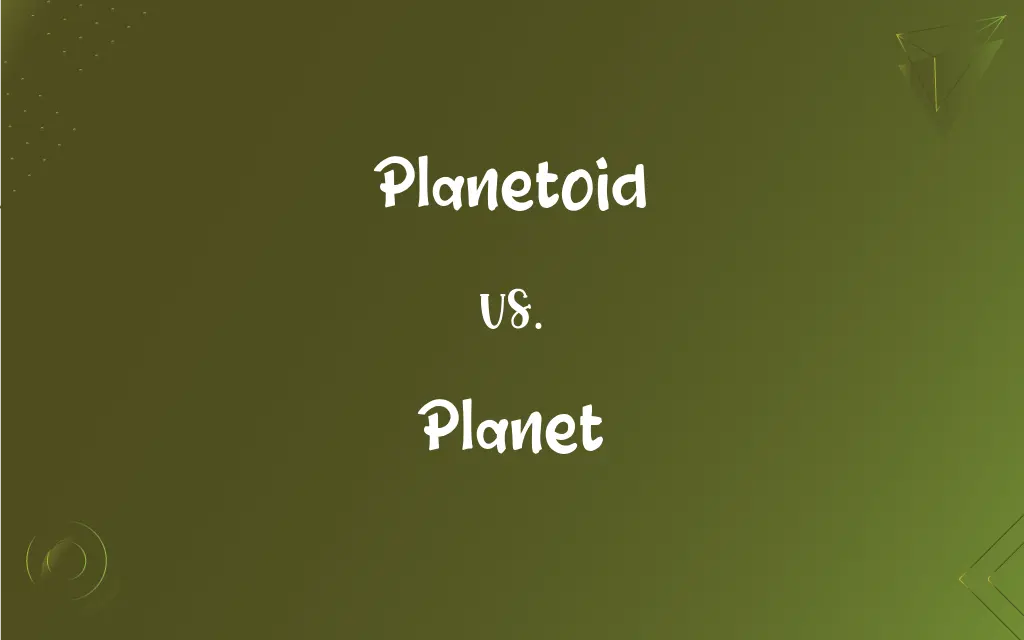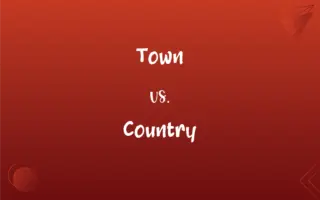Planetoid vs. Planet: What's the Difference?
By Harlon Moss & Aimie Carlson || Updated on May 24, 2024
A planetoid is a small celestial body orbiting the sun, larger than an asteroid but not meeting all criteria for a planet, while a planet is a large celestial body orbiting a star, clearing its orbit and having sufficient gravity to be spherical.

Key Differences
A planetoid, often referred to as a dwarf planet, is a small celestial body that orbits the sun. It is larger than an asteroid but does not meet all the criteria required to be classified as a planet. Planetoids are typically found in the asteroid belt or the Kuiper Belt. Planets, on the other hand, are larger celestial bodies that orbit a star and meet specific criteria: they must be spherical due to their own gravity, orbit the sun, and have cleared their orbit of other debris.
Planetoids have not cleared their orbital paths of other objects, one of the key distinctions from planets. This means that they share their orbital zone with other bodies of similar size. Planets, however, dominate their orbits, having cleared them of other significant objects through gravitational forces.
The term "planetoid" includes bodies like Pluto and Ceres. These objects, while spherical and orbiting the sun, coexist with other similar-sized objects in their orbits. Planets such as Earth and Jupiter are much larger, have more significant gravitational pulls, and have distinct, clear orbits.
While planetoids are relatively small and often found in specific regions like the asteroid belt or Kuiper Belt, planets are more diverse in size and can be found throughout the solar system. Planets are also more likely to have moons, rings, and complex geological features compared to planetoids.
The classification of celestial bodies has evolved, with the International Astronomical Union (IAU) setting specific criteria in 2006 that led to the reclassification of Pluto from a planet to a dwarf planet, or planetoid. This distinction underscores the importance of orbital dynamics and gravitational dominance in defining planets.
ADVERTISEMENT
In scientific exploration, both planetoids and planets are of great interest, with missions targeting both types to understand their composition, history, and potential for hosting life.
Comparison Chart
Size
Smaller than planets, larger than asteroids
Generally large celestial bodies
Orbital Clearing
Does not clear its orbit of other objects
Clears its orbit of other debris
Regions Found
Asteroid belt, Kuiper Belt
Throughout the solar system
Examples
Pluto, Ceres
Earth, Jupiter
ADVERTISEMENT
Classification
Dwarf planet or minor planet
Major celestial body meeting IAU criteria
Planetoid and Planet Definitions
Planetoid
A small celestial body orbiting the sun, larger than an asteroid.
Ceres is classified as a planetoid.
Planet
A large celestial body orbiting a star.
Earth is the third planet from the sun.
Planetoid
Also known as a dwarf planet.
Pluto is a well-known planetoid.
Planet
Clears its orbit of other debris.
Jupiter has cleared its orbit of other objects.
Planetoid
Found in regions like the asteroid belt.
Many planetoids are located in the Kuiper Belt.
Planet
Can have moons and rings.
Saturn is a planet known for its rings.
Planetoid
Spherical due to self-gravity but not dominant in its orbit.
A planetoid like Eris has a round shape.
Planet
Sufficient gravity to be spherical.
Mars is a planet with a nearly round shape.
Planetoid
Does not clear its orbit of other objects.
Planetoids share their orbital space with other bodies.
Planet
In the traditional model of solar systems, a celestial body larger than an asteroid or comet, illuminated by light from a star, such as the sun, around which it revolves.
Planetoid
See asteroid.
Planet
A celestial body that orbits the sun, has sufficient mass to assume nearly a round shape, clears out dust and debris from the neighborhood around its orbit, and is not a satellite of another planet.
Planetoid
(astronomy) An asteroid of any size
Planet
One of the seven celestial bodies, Mercury, Venus, the moon, the sun, Mars, Jupiter, and Saturn, visible to the naked eye and thought by ancient astronomers to revolve in the heavens about a fixed Earth and among fixed stars.
Planetoid
(astronomy) An asteroid-like body in an orbit beyond the asteroid belt, such as a centaur or Kuiper belt object
Planet
The collection of life forms supported on Earth
An asteroid that threatened the whole planet.
Planetoid
(astronomy) A larger, planetary, body in orbit around the Sun, such as Vesta or (candidate) dwarf planets such Eris or Sedna
Planet
People as a whole; humankind or the general public
The entire planet was affected by the global recession.
Planetoid
(astronomy) A dwarf planet
Planet
One of the seven revolving astrological celestial bodies that in conjunction with the stars are believed to influence human affairs and personalities.
Planetoid
A body resembling a planet; an asteroid.
Planet
Each of the seven major bodies which move relative to the fixed stars in the night sky—the Moon, Mercury, Venus, the Sun, Mars, Jupiter and Saturn.
Planetoid
Any of numerous small celestial bodies composed of rock and metal that move around the sun (mainly between the orbits of Mars and Jupiter)
Planet
(astronomy) A body which is massive enough to be in hydrostatic equilibrium (generally resulting in being an ellipsoid) but not enough to attain nuclear fusion and, in IAU usage, which directly orbits a star (or star cluster) and dominates the region of its orbit; specifically, in the case of the Solar system, the eight major bodies of Mercury, Venus, Earth, Mars, Jupiter, Saturn, Uranus, and Neptune.
Planet
Construed with|en|the or}} this}}: {{synonym of Earth.
Planet
A celestial body which revolves about the sun in an orbit of a moderate degree of eccentricity. It is distinguished from a comet by the absence of a coma, and by having a less eccentric orbit. See Solar system.
Planet
A star, as influencing the fate of a men.
There's some ill planet reigns.
Planet
Any of the celestial bodies (other than comets or satellites) that revolve around the sun in the solar system
Planet
A person who follows or serves another
Planet
Found throughout the solar system.
Planets like Neptune are located far from the sun.
FAQs
What defines a planet?
A celestial body that orbits a star, is spherical due to its gravity, and has cleared its orbit of other debris.
What is a planetoid?
A small celestial body orbiting the sun, larger than an asteroid but not meeting all criteria for a planet.
Are planetoids and dwarf planets the same?
Yes, the terms are often used interchangeably.
How does a planetoid differ from a planet?
A planetoid does not clear its orbit of other objects, whereas a planet does.
Can planetoids have moons?
Some planetoids, like Pluto, have moons.
What led to the reclassification of Pluto?
The IAU's 2006 criteria requiring planets to clear their orbits.
What are examples of planetoids?
Pluto and Ceres.
Where are planetoids commonly found?
In the asteroid belt and Kuiper Belt.
Can planetoids be considered planets in the future?
Only if they meet all the criteria set by the IAU.
How many planets are in the solar system?
There are eight recognized planets in the solar system.
Is Ceres a planet or a planetoid?
Ceres is classified as a planetoid or dwarf planet.
Are all spherical celestial bodies planets?
No, they must also clear their orbits and orbit a star.
Do planets have to orbit the sun?
In our solar system, yes, but exoplanets orbit other stars.
Do planetoids have atmospheres?
Some planetoids may have thin atmospheres.
What is the main criterion for being a planet?
Clearing its orbit of other debris.
How do scientists study planetoids?
Through telescopes and space missions.
What is the Kuiper Belt?
A region beyond Neptune filled with small icy bodies, including planetoids.
Why is Earth considered a planet?
It orbits the sun, is spherical, and has cleared its orbit.
What are the largest planetoids?
Pluto and Eris are among the largest.
Can planetoids support life?
It is unlikely, but some may have conditions worth studying.
About Author
Written by
Harlon MossHarlon is a seasoned quality moderator and accomplished content writer for Difference Wiki. An alumnus of the prestigious University of California, he earned his degree in Computer Science. Leveraging his academic background, Harlon brings a meticulous and informed perspective to his work, ensuring content accuracy and excellence.
Co-written by
Aimie CarlsonAimie Carlson, holding a master's degree in English literature, is a fervent English language enthusiast. She lends her writing talents to Difference Wiki, a prominent website that specializes in comparisons, offering readers insightful analyses that both captivate and inform.































































